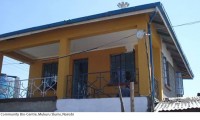Working in collaboration with SKL International (Stockholm), Eco-build Africa has been developing the Kenyan SymbiocityProgramme. The SymbioCity approach is a holistic approach to sustainable urban development. The concept puts emphasis on methods and tools for an integrated approach to sustainable urban development using horizontal and interdisciplinary working procedures amongst the stakeholders.
The SymbioCity Approach is based on participatory and inclusive principles. The approach can be applied at all levels of development planning and implementation, from policy development, urban planning, through to projects in various sectors, e.g. water, energy, waste management, etc.
The main benefit of the SymbioCity Approach is that it looks at not only the environmental and social aspects of city functions, but also their profitability as part of the sustainable urban development.
The seven building blocks of SymbioCity are: Architecture, Landscape Planning, Water Supply and Sanitation, Energy, Waste Management, Traffic Management and Transport, Urban Functions, and Industry and Buildings. Sweden has a long history of sustainable development, making it one of the most advanced countries in environmental technology. Swedish companies have had a long experience working with sustainable technologies, both in Sweden and internationally.
Urban development is one of the key areas for Swedish development cooperation with Kenya. There are also opportunities for increased cooperation and trade between Kenya and Sweden. SymbioCity offers one strong practical starting point for this cooperation and to support sustainable urban development in Kenya. This is why Kenyan stakeholders are intent on partnering with Sweden to adopt and apply the SymbioCity Approach in our development.
Eco-build Africa and SKL International have developed a programme through stakeholder participation that encompasses urban planning, sectoral projects, County level pilots, and institutional support for sustainable urban development to be rolled out in the next four years.
















